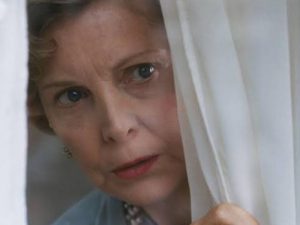audiences alike. In 1961, she joined the cast of Coronation Street, portraying Nona Willis, a barmaid at the legendary Rovers Return Inn. Though her run on the show lasted only ten episodes, her presence was impactful. The role challenged her — particularly the strong Northern accent required — and Ferris later admitted it was one of the reasons she stepped away from the part. Even so, her brief stint became a cult favorite among longtime fans of the series.
While her time on Coronation Street was short, Ferris’s broader career flourished. She transitioned to film in the early 1960s and gained critical attention for her performance in Children of the Damned (1964), a chilling sci-fi thriller. However, it was her lead role in Catch Us If You Can (1965), a stylish British film starring alongside the Dave Clark Five, that truly put her on the map. Her portrayal of Dinah, a free-spirited model caught up in a spontaneous road trip, captured the spirit of 1960s youth culture. Ferris became an icon of the era — not just for her beauty, but for her quiet strength and subtle, intelligent performances.
Throughout the 1970s and 1980s, Ferris continued to act in film, television, and stage productions, choosing her roles carefully and often gravitating toward complex, layered characters. She shone on stage in productions like Edward Bond’s Saved and Terence Frisby’s There’s a Girl in My Soup, earning praise for her poise and emotional depth.
Her final film appearance came in The Krays (1990), a gritty biopic about the infamous London gangster twins. Even in a smaller supporting role, Ferris brought a sense of dignity and compassion that stood out amid the film’s violence and tension.
Outside of acting, Ferris led a quiet, private life. She married film producer John Quested in 1960, and together they had three children. The couple remained devoted to one another for over six decades. Barbara was also the elder sister of Pam Ferris, another renowned British actress known for her roles in Matilda, Call the Midwife, and Harry Potter and the Prisoner of Azkaban. The sisters shared a deep bond, though they seldom appeared on screen together.
Those who knew Barbara Ferris describe her as graceful, kind, and deeply intelligent. She had no interest in celebrity for its own sake and instead found joy in the craft of storytelling. She was known to be generous with younger actors and respected by directors for her work ethic and subtle brilliance.
Tributes have poured in across social media and from industry colleagues. Many remember her as a symbol of a different time in television and film — an era where understatement and sincerity were the mark of true talent.
“She didn’t need to shout to be heard,” one former co-star said. “Barbara’s strength was always in what she didn’t say — her expressions, her stillness, the way she held a moment.”
Though she stepped back from public life in her later years, Ferris remained a cherished part of the British acting legacy. Her contributions to television, film, and theatre will not be forgotten.
Final Reflections:
Barbara Ferris may not have courted fame, but her work touched generations. Whether as the short-lived Nona on Coronation Street, a rebellious icon of the 1960s, or a dignified presence in British cinema, she left an indelible mark. She lived a life of quiet artistry — and now, she takes her final bow, remembered with admiration, respect, and love.